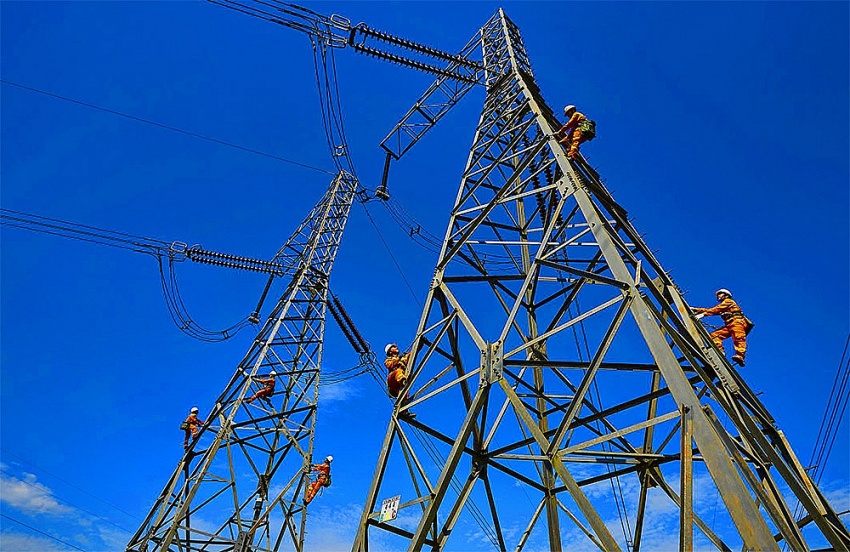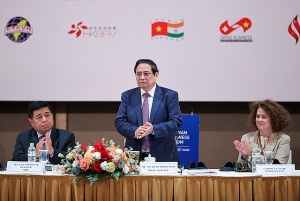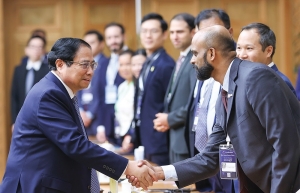High-tech investment influx reliant on stable power supply
Prime Minister Pham Minh Chinh last week urged local authorities to resolve land clearance difficulties for vital national energy works and projects.
 |
He also required more drastic solutions to ensure the supply of electricity, coal, and gas for production in the coming time. PM Chinh requested the steering committee for key energy projects to focus on implementing tasks on investment and building projects in the energy sector under various resolutions.
In addition, at the Vietnam Business Forum (VBF) held in Hanoi last week, the PM pledged to investors that there will be no electricity shortages, and investment would be made in the direction of green growth.
Hong Sun, chairman of the Korean Chamber of Business in Vietnam, said at the forum that many South Korean companies, especially those in high-tech industries, aspire to enter the Vietnamese market but have identified power shortage issues in Vietnam as a significant factor delaying their decisions. Other global companies in advanced industries that the Vietnamese government aims to attract also have a similar sentiment.
“South Korean companies currently show keen interest in technology-intensive industries that align with environmental trends, such as rooftop solar power projects. However, due to the unstable power supply and unclear regulations, they are reluctant to proceed with investments in these areas,” Sun said.
According to the Power and Energy Working Group of the VBF, many of these high-tech industries have their own emission targets, and they are looking to countries that can provide such power resources, through consistently delivered green energy generation and transmission infrastructure.
To unlock potential, investors have been respectfully requesting the establishment of effective measures for stable power supply within industrial zones in particular, ensuring that foreign-invested companies can confidently engage in manufacturing activities.
“To sustain our growth and leadership in high-tech manufacturing and digitalisation, Vietnam must accelerate its power generation sector transformation,” said a representative of the working group. “This involves enhancing our energy infrastructure and developing a robust legal framework that enables the adoption of cleaner and renewable energies and promotes energy efficiency.”
Last summer, numerous localities in the north of Vietnam such as Bac Ninh, Hai Duong, Nam Dinh, and Vinh Phuc experienced power shortages and partial outages. Additionally, industrial areas in these regions implemented scheduled power outages approximately 1-2 times per week.
“Last year’s power shortages served as a stark reminder of the fragility of our progress. Businesses suffered, innovation stalled, and our competitive edge was dulled. This cannot be our narrative in 2024,” said the representative. “We must ensure that our energy infrastructure is robust, reliable, and ready to support the voracious demands of a digital economy.”
Since the outages occurred, the Ministry of Industry and Trade, Vietnam Electricity (EVN), and private sector stakeholders held several dialogues to explore viable short-term and long-term solutions for Vietnam to meet its energy security needs, including advancing approval of large liquified natural gas projects that support energy security and transition goals.
In addition, the Vietnamese government determines that the implementation of strategic plans such as the National Power Development Plan, the development of a decree on rooftop solar development, and guidance on direct power purchase agreements (DPPAs) are pivotal.
At a meeting between Prime Minister Chinh and EVN in mid-January, the PM clearly stated three goals that the latter needs to achieve. He required EVN not to lack electricity for production, business, and consumption under any circumstances.
It must also manage and operate electricity industry prices according to market rules, and restructure itself to balance finances, promote production and business, and focus on the development of emerging fields.
Along with the effort of the government, a significant volume of foreign investment could support this, once more clarity and certainty can be provided by the market.
“Keeping energy systems working is an essential goal of good energy governance, and granting investors access to renewable energy is a competitive advantage for the country,” said Joseph Uddo, chairman of the American Chamber of Commerce in Hanoi. “Power supply and demand dynamics are complex, and a collaborative approach between the public and private sectors is essential to develop affordable, reliable, and sustainable electricity.”
US investors are looking forward to continuing working with the government to make rapid progress on the mobilisation plan set out by the Just Energy Transition Partnership, Uddo added, while investors and customers are willing to support implementation of a DPPA mechanism, which is planned for launch in July.
 | Government and enterprises outline efforts to implement green growth strategies at VBF 2024 The Vietnam Business Forum (VBF 2024) took place this morning in Hanoi, themed "FDI enterprises pioneer in implementing green growth strategies" and chaired by Prime Minister Pham Minh Chinh. |
 | Game-changing ESG initiatives expected With the Vietnamese government last week boosting commitments to supporting foreign-invested enterprises, more green business and funding initiatives are expected in the coming months. |
 | Project procedures must be truncated A number of obstacles in administrative procedures, especially in granting business licences, are hindering the market entry of businesses in Vietnam. |
What the stars mean:
★ Poor ★ ★ Promising ★★★ Good ★★★★ Very good ★★★★★ Exceptional
Related Contents
Latest News
More News
- Hermes joins Long Thanh cargo terminal development (February 04, 2026 | 15:59)
- SCG enhances production and distribution in Vietnam (February 04, 2026 | 08:00)
- UNIVACCO strengthens Asia expansion with Vietnam facility (February 03, 2026 | 08:00)
- Cai Mep Ha Port project wins approval with $1.95bn investment (February 02, 2026 | 16:17)
- Repositioning Vietnam in Asia’s manufacturing race (February 02, 2026 | 16:00)
- Manufacturing growth remains solid in early 2026 (February 02, 2026 | 15:28)
- Navigating venture capital trends across the continent (February 02, 2026 | 14:00)
- Motivations to achieve high growth (February 02, 2026 | 11:00)
- Capacity and regulations among British areas of expertise in IFCs (February 02, 2026 | 09:09)
- Transition underway in German investment across Vietnam (February 02, 2026 | 08:00)

 Tag:
Tag:




















 Mobile Version
Mobile Version